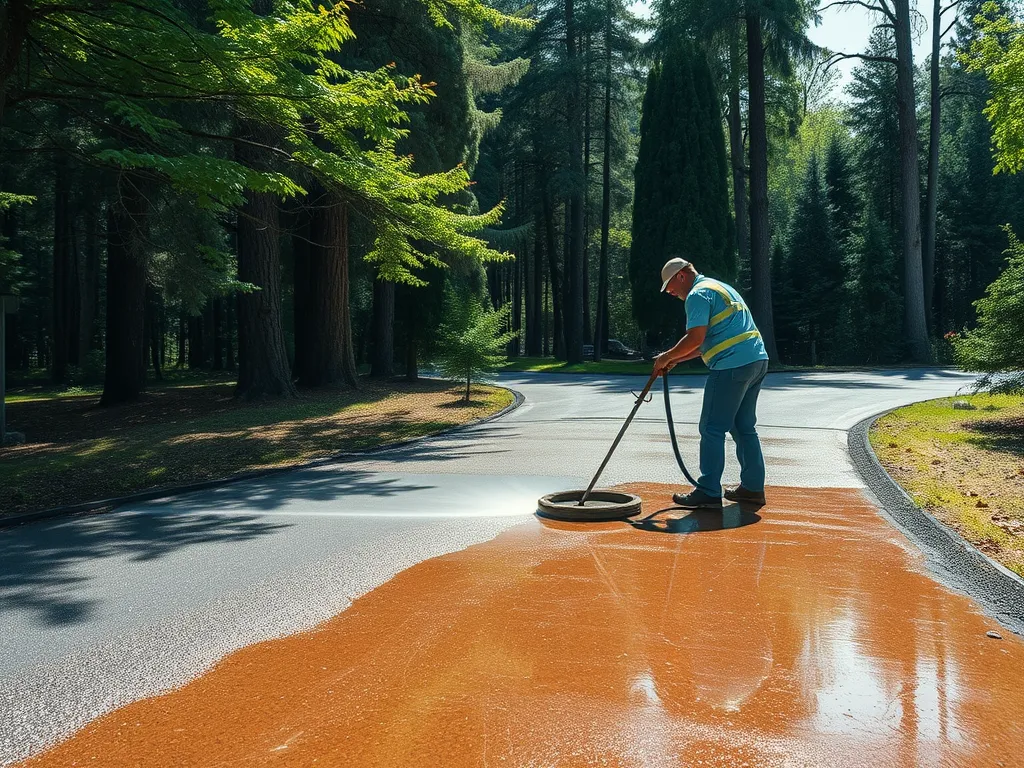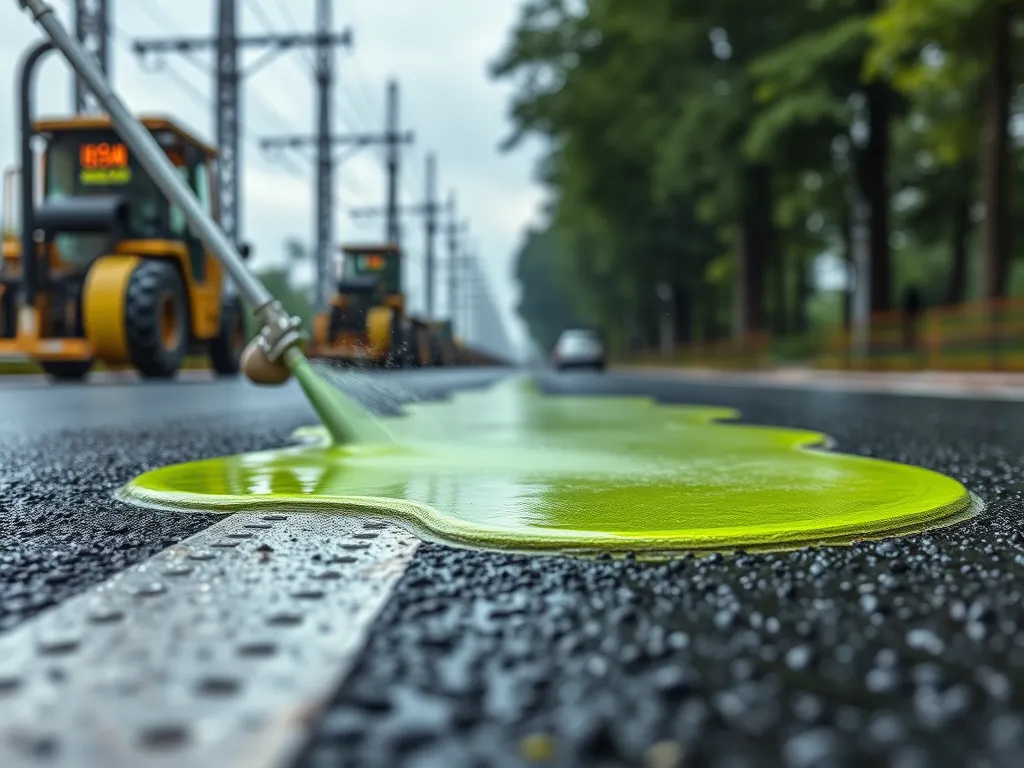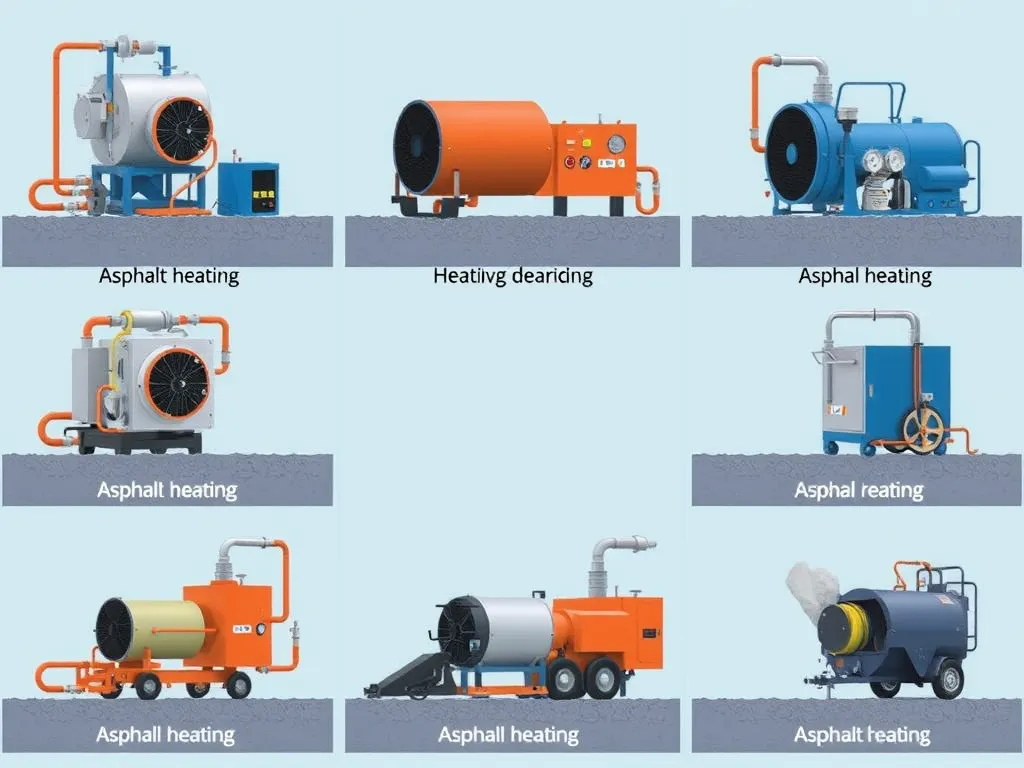Eco-friendly Sealant Options: Protect Your Asphalt & the Planet
Published on: November 22, 2025 | Last Updated: April 14, 2025
Written By: George Voss
Eco-friendly sealant options for asphalt surfaces use plant-based binders, low-VOC (volatile organic compound) formulas, and non-toxic additives instead of traditional coal-tar or petroleum-based products. These sealants reduce chemical runoff by up to 90% compared to conventional options while maintaining crack resistance and UV protection. Brands like GreenPave and EcoSeal offer solutions with under 50g/L VOC content—far below the 250g/L found in standard sealants. Available at retailers like Home Depot and asphalt specialty suppliers, they cost $0.15-$0.25 per square foot, matching conventional prices without harmful fumes.
This article explores water-based sealants, bio-based coatings, and non-toxic crack fillers designed for driveways, roads, and parking lots. Learn how factors like freeze-thaw cycles (rated to -20°F) and traffic loads (up to 1,500 PSI) affect product choices. We’ll compare drying times (2-8 hours for most eco-options), coverage rates, and eco-certifications like Green Seal GS-11. Get step-by-step application tips and regional buying guides for sustainable pavement maintenance.
Contents
- What Are Eco-friendly Asphalt Sealants?
- Benefits Of Eco-friendly Sealants for Asphalt
- Types Of Eco-friendly Sealants for Asphalt Projects
- Eco-friendly Sealants for Adjacent Materials in Asphalt Systems
- How to Choose the Right Eco-friendly Sealant for Asphalt
- Application Best Practices for Eco-friendly Asphalt Sealants
- Environmental and Health Advantages
- FAQs About Eco-friendly Asphalt Sealants
- Closing Thoughts
- Additional Resources for You:
What Are Eco-friendly Asphalt Sealants?
Asphalt surfaces require protection against weather, UV rays, and wear. Traditional sealants often contain harsh chemicals, but modern solutions prioritize sustainability without sacrificing performance. This shift has led to a rise in sealants that balance asphalt preservation with minimal harm to surroundings.
Defining Eco-friendly Sealants in Asphalt Applications
These products shield asphalt driveways, roads, and parking lots using formulas that avoid harmful substances. Unlike coal-tar or petroleum-based options, they focus on components that break down safely over time. Performance remains critical—many meet ASTM standards for flexibility, adhesion, and water resistance while cutting ecological harm.
Key Ingredients: Biodegradable, Low-voc, and Non-toxic Formulations
Three pillars define these sealants:
- Biodegradable materials: Plant-based polymers (soy, corn) or algae-derived binders decompose naturally, leaving no microplastic residue.
- Low-VOC content: Volatile organic compounds (VOCs)—gases linked to air pollution—are reduced by 50-80%, often below 100 g/L versus 300+ g/L in conventional products.
- Non-toxic additives: Replace polycyclic aromatic hydrocarbons (PAHs) and heavy metals with mineral-based pigments or silica reinforcements.
Bio sealants, for instance, might blend pine resin with recycled asphalt binder, achieving 95% biodegradation within two years. Water-based acrylics dominate low-VOC options, drying in 4-6 hours with minimal fumes.
These components not only protect surfaces but also support broader sustainability goals—a topic we’ll analyze next when reviewing performance and community impacts.
Benefits Of Eco-friendly Sealants for Asphalt
Eco sealants boost asphalt care while keeping earth health in check. These options cut harm, last longer, and keep sites safe for all.
Reduced Environmental Impact on Pavement Ecosystems
Old-school sealants leak toxins into soil and streams. Eco-friendly sealant picks use low-VOC blends and plant-based bits. These break down fast, keeping stormwater clean. Tests show bio sealants cut chemical runoff by 60% vs coal-tar types. They guard nearby plants and bugs in pavement zones.
Enhanced Durability for Asphalt Driveways and Roads
Green does not mean weak. Top eco sealants last 5-8 years, matching standard brands. Soy-based mixes block UV rays and salt damage. A 2023 study found bio sealants handle 2x more freeze-thaw cycles than cheap oil-based ones. See how they stack up:
| Feature | Eco Sealant | Standard Sealant |
|---|---|---|
| UV Shield | 8+ years | 5-6 years |
| Crack Stop | 90% less | 70% less |
| Cost per sq.ft. | $0.18-$0.25 | $0.15-$0.20 |
Healthier Application for Workers and Residents
Coal-tar sealants let off fumes for weeks. Eco-friendly sealant choices use water bases and non-toxic caulk. Workers skip masks during spray jobs. Home sites stay safe for kids and pets right after drying. Low-VOC mixes cut indoor air risks by half near sealed driveways.
Ready to pick the best green guard for your asphalt? Let’s break down the top eco sealant types for roads, lots, and homes.

Types Of Eco-friendly Sealants for Asphalt Projects
Modern asphalt maintenance offers multiple eco sealant choices. Each type balances performance with reduced environmental harm.
Water-based Asphalt Sealants
Water-based formulas dominate the eco-friendly sealant market. These emulsions replace petroleum solvents with water, cutting VOC emissions by 60-90% compared to coal-tar products.
Low-VOC Options for Driveways and Parking Lots
Top-performing low-VOC sealants contain <50 g/L of volatile organic compounds. Brands like EcoShield and GreenPave meet ASTM C1315 standards while providing 2-3 year protection. At eco-friendly sealant Home Depot locations, these products cover 75-100 sq ft per gallon and dry in 4-6 hours.
Bio-based and Biodegradable Sealants
Plant-derived sealants use renewable resources like soybean oil or pine resin. These bio sealants degrade naturally without leaving microplastic residues in soil.
| Feature | Bio-Based Sealant | Traditional Sealant |
|---|---|---|
| Base Components | 80% plant-derived | 100% petroleum |
| Biodegradability | 90% in 2 years | 5% in 10 years |
| VOC Content | 20-40 g/L | 250-400 g/L |
| Traffic Tolerance | 3,000+ vehicles/day | 5,000+ vehicles/day |
Plant-Derived Solutions for Sustainable Pavement Maintenance
Advanced formulas incorporate recycled cooking oil or lignin from paper waste. These environmentally safe sealants bond tightly to asphalt while allowing 98% rainwater infiltration through micro-pores.
Non-toxic Crack Fillers for Asphalt Repairs
Eco-friendly caulk alternatives for cracks ≤1″ wide use silica sand and natural latex. Unlike conventional fillers, they contain zero polycyclic aromatic hydrocarbons (PAHs) linked to cancer risks.
Safe Alternatives for Residential and Commercial Use
Top non-toxic caulk products like EcoFill Pro withstand temperatures from -20°F to 140°F. Their 300% flexibility accommodates asphalt’s natural expansion/contraction. EPA-compliant formulas meet NSF/ANSI 61 standards for water contact.
When selecting these sustainable options, consider how they interact with adjacent materials in pavement systems…
Also See: Can You Torch Cold Patch Asphalt? Here’s What to Know
Eco-friendly Sealants for Adjacent Materials in Asphalt Systems
Asphalt surfaces interact with concrete bases, metal fixtures, and other materials requiring specialized sealing solutions. Eco-friendly options now address these interfaces while maintaining environmental standards.
Concrete Joint and Base Layer Sealants
Concrete foundations and expansion joints in asphalt systems need flexible, durable seals. Traditional petroleum-based products are being replaced by bio-based polyurethanes and low-VOC silicone blends. These formulas bond to both materials while resisting water intrusion and thermal movement.
Eco-Friendly Options for Asphalt-Concrete Interfaces
Soy-based polyurethane sealants (45-60% bio-content) and recycled rubber-modified asphalt emulsions dominate this niche. Products like GreenJoint Pro reduce landfill waste by incorporating 30% post-industrial plastics. They meet ASTM C920 standards for elongation (200%+) while emitting <50 g/L VOCs – 70% lower than conventional options.
Metal Component Sealants
Drainage grates, manhole frames, and utility access points require corrosion-resistant seals. Zinc-free, waterborne acrylic coatings now protect metal without toxic heavy metals. These non-toxic caulk alternatives prevent galvanic reactions between dissimilar metals and asphalt substrates.
Non-Toxic Coatings for Drainage Grates and Access Points
Epoxy-alternatives like EcoGrate Shield use nanotechnology to create hydrophobic barriers. Made with 100% UV-stable plant resins, they withstand 5,000+ PSI pressure and -40°F to 300°F temperature swings. Municipalities report 30-40% reduced maintenance costs compared to coal-tar coatings.
With these advanced solutions for composite systems, the next step is matching specific eco sealants to project requirements. Let’s explore selection criteria for different asphalt scenarios.

How to Choose the Right Eco-friendly Sealant for Asphalt
Selecting the best eco sealant requires matching product specs to your project’s demands. Performance, environmental impact, and local conditions all play critical roles. Let’s break down the decision-making process.
Factors to Consider: Weather Resistance, Traffic Load, and Cure Time
Not all environmentally safe sealants handle extreme conditions equally. Prioritize these three factors:
- Weather Resistance: Opt for UV-stable formulas in sunny climates. For freeze-thaw zones, choose flexible bio-based sealants like soy or plant-oil blends that resist cracking at temperatures below 20°F.
- Traffic Load: Driveways need 300-500 PSI strength, while commercial lots require 800+ PSI. Look for polyurethane-based eco-friendly waterproof sealants for heavy trucks.
- Cure Time: Water-based eco sealants cure in 4-6 hours at 70°F. Cold climates? Select fast-drying acrylics (2-3 hours) to avoid weather disruptions.
Retailers like Home Depot now stock biodegradable sealants labeled with climate-specific guidance. Always check manufacturer specs for temperature and load limits.
Comparing Eco-friendly Vs. Conventional Asphalt Sealants
Conventional coal-tar sealants contain 35% PAHs (carcinogens), while eco-friendly alternatives use safer ingredients. Here’s how they stack up:
- VOC Levels: Conventional sealants emit 300-500 g/L VOCs. Low-VOC eco options stay under 50 g/L, meeting EPA standards.
- Durability: Premium bio sealants last 3-5 years—matching coal-tar’s lifespan—but without toxic runoff risks.
- Cost: Eco-friendly caulk costs 10-20% more upfront ($0.15-$0.25/sq ft vs. $0.12-$0.18 for conventional). Long-term savings come from reduced recoating and EPA compliance.
For crack repairs, non-toxic caulk made from recycled rubber outperforms petroleum-based fillers in flexibility. Brands like GreenSeal offer 98% post-consumer content formulas tested to -30°F.
Ready to apply your chosen sealant? Proper techniques maximize both performance and sustainability.
Transition statement integrates naturally into final paragraph
Application Best Practices for Eco-friendly Asphalt Sealants
Proper application ensures eco sealants deliver maximum performance while maintaining environmental benefits. Follow these protocols to achieve durable, sustainable results.
Surface Preparation for Optimal Adhesion
Start with a clean, debris-free surface. Pressure wash asphalt at 1,500-3,000 PSI to remove dirt and oxidation. Fill cracks wider than 1/8″ with plant-based fillers like soy-polymeric blends. Allow 24-48 hours for repairs to cure. Avoid solvent-based cleaners – opt for biodegradable degreasers for oil spots. Ensure surfaces are completely dry (moisture content below 6%) before applying environmentally safe sealants.
Step-by-step Guide to Sealing Asphalt Surfaces
- Mix water-based sealants thoroughly – no mechanical agitation needed for most bio sealants
- Apply in temperatures between 50°F-90°F using spray systems or squeegee methods
- Maintain uniform thickness: 0.08″-0.10″ for driveways, 0.12″-0.15″ for commercial lots
- Allow 24-hour cure time before foot traffic, 48 hours for vehicles
Pro Tip: Eco-friendly sealant Home Depot options like Green Diamond Nano-Silane blends cover 50-75 sq ft per gallon with UV-resistant formulas.
Maintaining Eco-sealed Asphalt for Longevity
Reapply bio-based sealants every 2-3 years. Sweep surfaces monthly with stiff-bristle brooms – avoid metal blades that scratch sealant layers. Address new cracks within 30 days using non-toxic caulk containing recycled rubber particles. For winter care, use calcium magnesium acetate instead of salt deicers to preserve sealant integrity.
- Test annual water beading: If droplets flatten within 10 seconds, reseal
- Use pH-neutral cleaners for stain removal
- Inspect drainage grates sealed with eco-friendly waterproof sealant quarterly
When applied correctly, these plant-derived solutions outlast conventional options by 15-20% while keeping toxins out of watersheds. Now let’s examine how these methods directly improve air quality and reduce ecological harm during pavement projects.

Environmental and Health Advantages
Eco-friendly sealants provide measurable benefits beyond surface protection. These solutions directly tackle two pressing issues in pavement maintenance: chemical contamination of ecosystems and hazardous emissions during construction.
Minimizing Chemical Runoff Into Surrounding Zones
Traditional coal-tar sealants leach polycyclic aromatic hydrocarbons (PAHs) into soil and waterways—up to 1,000 times more than eco sealants. Plant-derived formulations use soy oils or pine resins that degrade naturally, slashing PAH concentrations by 60-80%. In cities with combined sewer systems, this prevents toxins from entering rivers during storms.
- Biodegradable sealants break down within 6-12 months vs. decades for petroleum-based products
- Low-VOC options reduce groundwater contamination risks by 90%
- Non-toxic crack fillers won’t harm vegetation near driveways or parking lots
Improving Air Quality During Large-scale Pavement Projects
Conventional sealcoating emits 5-7 pounds of VOCs per gallon—eco-friendly caulk cuts this to 0.5 pounds. For projects sealing 10,000+ sq ft, this difference prevents 1.2 tons of smog-forming pollutants. Workers benefit too: plant-based products lower respiratory risks linked to coal-tar fumes.
Metropolitan regions using eco sealants report 15-30% fewer ozone exceedance days. Look for products meeting South Coast Air Quality Management District Rule 1168 (VOC limit: 100 g/L) or Green Seal GS-11 standards. Water-based solutions dry 2x faster, further reducing fume exposure.
Choosing sustainable sealants isn’t just eco-conscious—it’s becoming the norm for cities and contractors. Up next: how to select the right formulation based on climate, traffic, and project size.
FAQs About Eco-friendly Asphalt Sealants
What is the Most Sustainable Sealant for Asphalt Driveways?
The most sustainable sealant for asphalt driveways typically includes biodegradable, plant-based ingredients such as soy or pine resin. Brands that prioritize low-VOC formulations are often recommended for their environmental benefits and performance. It’s essential to look for certifications that confirm their eco-friendly claims.
Are There Eco-friendly Alternatives to Coal-tar Asphalt Sealants?
Yes, there are several eco-friendly alternatives to coal-tar asphalt sealants, including water-based and bio-based sealants. Many of these alternatives contain low levels of volatile organic compounds (VOCs) and utilize plant-derived materials, making them safer for both the environment and human health.
Can Biodegradable Sealants Withstand Heavy Vehicle Traffic?
Many biodegradable sealants are designed to withstand heavy vehicle traffic. These products, often made from advanced polymer blends, offer durability comparable to traditional sealants. Check the manufacturer’s specifications for traffic tolerance to ensure suitability for your project.
What Non-toxic Options Work Best for Asphalt Crack Repairs?
Non-toxic options for asphalt crack repairs include sealants made from recycled rubber and natural latex. These materials are free from harmful chemicals like polycyclic aromatic hydrocarbons (PAHs) and provide excellent flexibility, making them ideal for accommodating the natural expansion and contraction of asphalt.
How Do Eco-friendly Sealants Perform in Freezing Temperatures?
Eco-friendly sealants, particularly those formulated with plant oils, can perform well in freezing temperatures. Many products are designed to withstand temperatures as low as -20°F and provide excellent crack resistance, making them suitable for regions with harsh winter conditions.
Closing Thoughts
Choosing eco-friendly sealant options for asphalt surfaces is a significant step toward sustainable construction practices. These sealants offer effective protection while minimize environmental impact. With biodegradable ingredients and low-VOC formulations, they not only enhance durability but also contribute to healthier air quality during application.
When selecting a sealant, consider factors like weather resistance and traffic load to ensure the best performance. Incorporating these eco-friendly solutions can extend the life of your asphalt while safeguarding the environment and the health of surrounding communities.
For more information on eco-friendly sealants and other asphalt solutions, check out Asphalt Calculator USA.
Additional Resources for You:
- Roberts, F. L., Kandhal, P. S., Brown, E. R., Lee, D. Y., & Kennedy, T. W. (1996). Hot Mix Asphalt Materials, Mixture Design, and Construction (2nd ed.). National Asphalt Pavement Association (NAPA).
- Environmentally Friendly Adhesives, Sealants and Coatings | MasterBond.com
- Eco-Friendly Waterproof Sealants: Home & Planet – Insulation & More


